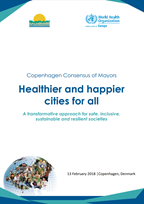Event
Urban health short films screening in Türkiye with the Healthy Cities Network
The approach seeks to put health high on the political and social agenda of cities and to build a strong movement for public health at the local level. It strongly emphasizes equity, participatory governance and solidarity, intersectoral collaboration and action to address the determinants of health.
Successful implementation of this approach requires innovative action addressing all aspects of health and living conditions, and extensive networking between cities across Europe and beyond. This entails:
The Healthy Cities approach recognizes the determinants of health and the need to work in collaboration across public, private, voluntary and community sector organizations. This way of working and thinking includes involving local people in decision-making, requires political commitment and organizational and community development, and recognizes the process to be as important as the outcomes.The concept of Healthy Cities was inspired and supported by the WHO European Health for All strategy and the Health21 targets. It is fully aligned with the European policy framework Health2020 and the 2030 Agenda for Sustainable Development.
WHO Healthy Cities is a global movement working to put health high on the social, economic and political agenda of city governments.
For 30 years the WHO European Healthy Cities Network has brought together some 100 flagship cities and approximately 30 national networks.
The flagship cities interact directly with WHO/Europe, while the national networks bring together cities in a given Member State. In both cases WHO provides political, strategic and technical support as well as capacity-building.
Together the flagship cities and national networks cover some 1400 municipalities.
Their shared goal is to engage local governments in political commitment, institutional change, capacity-building, partnership-based planning and innovation.
In 2018, the network celebrated its 30th year across the whole European Region, kicking off with the Summit of Mayors and building up to the International Healthy Cities Conference in Belfast in October.
For 3 decades the Healthy Cities movement has been a pioneering driver of change, creating healthier urban settings that support the health and well-being of the people that use them. It has also inspired Healthy Cities networks to blossom in all other WHO regions creating a global push for healthy cities.
The network will celebrate the past 30 years with an eye on the future, recognizing that cities are playing a critical role socially, culturally and politically.
Within a complex world of multiple tiers of government, numerous sectors working towards similar goals, and many stakeholders involved in the pursuit of health and well-being, cities are uniquely placed to provide leadership.
Global problems are being dealt with at a local level. The Healthy Cities vision acknowledges this.

This booklet provides an overview of the content, principles, goals and critical factors for the success of healthy cities in the 21st century. WHO European...

The COVID-19 pandemic hit older people hardest. This policy brief, intended for planners, policy-makers and politicians, was produced by the 16 cities...

This report provides a comprehensive overview of the proceedings and key discussions held during the 2023 WHO European Healthy Cities Annual Business Meeting...

Cities are drivers of innovation across public and private sectors towards enabling an economy that works for everyone. The following Political Statement...

The Implementation Framework document outlines the overall goals and development themes of Phase VII (2019–2024) of the WHO European Healthy Cities...

A transformative approach for safe, inclusive, sustainable and resilient societiesHealthy Cities foster health and well-being through governance, empowerment...
Urban health short films screening in Türkiye with the Healthy Cities Network